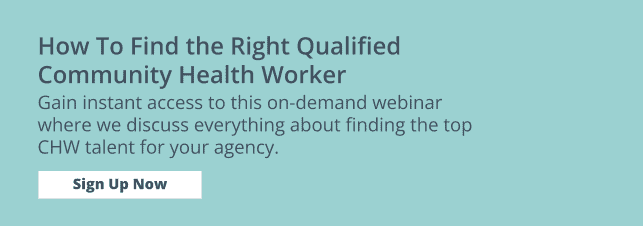What makes a good CHW — and how do you confidently find one? Use this guide to prepare for the next time you need to hire a Community Health Worker and score the best talent available for your organization.
best talent available for your organization.
This article explores how to interview a community health worker (CHW) so you can find the best match for your team. Just as you’d look for exceptional skills and dedication in an “all-star employee,” you’ll want to find those qualities in a CHW. We’ll walk you through the process, from figuring out what success looks like to crafting interview questions that get to the heart of what matters. By the end, you’ll be better equipped to find the perfect CHW for your community health project.Use this guide to prepare for the next time you need to hire a Community Health Worker and score the best talent available for your organization.
In this guide, you’ll find:
- How to prepare when interviewing your next CHW
- Essential skills for CHWs
- What to look for during the interview process
- Top 20 questions to ask your next CHW
How To Prepare When Interviewing Your Next CHW
Develop A Series Of Baseline Questions For Your CHW Interview

As with any hiring process, your interview is the first interaction with potential CHW candidates. As such, it’s the best time to secure that basic organizational needs could be met by the person you’re interviewing. Training a CHW can come later, so focus on other skills at this early stage.
Initial conversations could start with topics such as availability, role expectations, surface-level background information, and any relevant professional references.
Develop a series of baseline questions for your CHW interview
As with any hiring process, your interview is the first interaction with potential CHW candidates. As such, it’s the best time to secure that basic organizational needs could be met by the person you’re interviewing. Training a CHW can come later, so focus on other skills at this early stage.
Initial conversations could start with topics such as availability, role expectations, surface-level background information, and any relevant professional references.
Consider the specific community needs
Community Health Workers are frontline healthcare workers who serve to alleviate specific needs within a community. When selecting your next CHW, it’s crucial to keep your community in mind.
Things to consider when planning your interview:
- Does the candidate belong to the community you serve? A key element of CHWs is their shared cultural background with the population they serve. It’s this cultural connection that makes CHWs so special — and their role so effective in improving health outcomes.
- Does your CHW speak the language of the community? In the case of immigrants or other minorities, language skills are key in giving the population the best chance at accessing healthcare.
- Is there a bias or background element that could impact care? While this isn’t always the case and should be evaluated on an individual basis, certain cultural sensitivities are worth keeping in mind.

Essential skills for to look for when you hire a CHW
When hiring a CHW, keep in mind that they juggle a lot of different skills to give their patients access to the best resources and improve their health outcomes. Community health worker skills include Core Competencies or hard skills, and soft skills to fulfill their role.
Hard skills
Hard skills for CHWs refer to technical skills such as tech-savviness, research skills, professional training such as peer education, health literacy, working with electronic medical records, or using medical equipment properly.
CHWs must stay on top of the latest training and certifications to remain relevant and help their patients access the healthcare resources they need. A CHW who trains frequently, keeps their certifications up to date, and refreshes their knowledge consistently is one who will likely succeed in your organization.
You must also consider the cost of providing training to a more junior CHW or someone without the required training or certifications if you choose to bring them on board.
Soft skills
Soft skills for CHWs are harder to pin down. You can learn about your candidate’s soft skills with open-ended questions where they have the opportunity to share about past experiences. You can also observe them and pay close attention to how they communicate — not just their words, but body language, tone, and more.
7 must-have soft skills for CHWs:
- The ability to draw clear boundaries with the community, other staff, and themselves.
- Emotional resilience. Empathy and connection are key for CHWs. But it’s equally important to develop a high EQ (emotional quotient or emotional intelligence) and develop coping skills to prevent burnout and other mental health issues.
- Cultural sensitivity and an existing cultural connection. Are they able to communicate as peers with your community?
- The ability to work independently and be successful in team environments. When you hire a Community Health Worker, you need someone who’s self-directed yet has the ability to work collaboratively.
- The ability and willingness to learn new things. This includes new technology or tools, challenging situations in the field, and dealing with other issues on the go.
- Organizational skills. Are they able to organize and prioritize their work with minimal guidance?
- Clear communication. Are they able to clearly communicate an idea or resource?
What to look for during the interview process
Throughout the selection and interview process, observe more than the verbal communication with your candidate:
- Observe how the candidate presented themself: A clean, well-written resume or CV, a carefully crafted email, a thoroughly curated online presence if you’re using pages like LinkedIn, are your first indication of how the candidate handles themself.
- Consider body language when interacting with your potential CHW. Do they seem confident and open to speaking with you? Or are they uncomfortable, uneasy, perhaps avoiding eye contact?
- Listen actively during the interview. Listen to how they respond to your questions. Someone who speaks confidently and shows up prepared for your interview is committed to presenting their best in their professional career.
Top 22 questions to ask before you hire your next Community Health Worker
Below are the questions that one health system asked for recruiting their recent LGBTQ CHW:
Baseline questions:
Open your conversation with these questions to build rapport and get to know your candidate on a deeper level:
- What experience do you have that is relevant to the position of Community Health Worker?
- Can you share 2-3 aspects of this role that drew you to it?
- What are you looking to achieve as a CHW?
- Do you find any part of our mission and vision that resonates with you?
- Do you have a personal connection with the community we serve? What does it mean or represent to you?
- How do you typically plan and prioritize your work?
- What are some long-term goals you set out to achieve in your previous role? What did you do to get closer to them?
- Please share about a successful health education program you’ve developed or been involved in.
- Please tell me about a time when you de-escalated a difficult or dangerous situation in a community.
Skills-related questions:
Dig into your candidate’s skills with these questions:
- Please talk about any software and tools you’ve learned to use recently.
- Tell us about your ability to work under pressure.
- Have you used electronic health records software before? Which ones?
- From 1 to 10, how would you rate your tech skills? Do you feel confident using technology in your work?
- Please tell us about your experience working with cultures different from your own.
- What is your knowledge or understanding of cultural competencies and how would you apply cultural competencies to this position?
- Please discuss what recent professional training you’ve done.
- What certifications have you obtained in the last year?
- How do you keep up to date with new information in an ever-changing field?
- Have you been in a lead or management position before?
- How do you typically work in teams?
- Please tell us about an area of growth of yours? What specifically are you doing to grow in this area?
- What questions do you have for us?
Bringing It All Together
Combine job descriptions with specific interview questions to make a complete interview guide. This will be helpful when structuring fair interviews to compare several candidates. This method helps you understand each person better, figure out what training they might need, and see how they might do in the future.
Checking back on interviews after hiring someone gives you a good idea of how they’re doing and if they need any extra help. Talking openly about any worries before hiring can also help stop people from leaving the job later on.
In short, by being organized in your interviews, taking time to listen to candidates, and documenting results carefully, you can set up your CHW program for success, making a bigger difference in your organization’s community health efforts.


